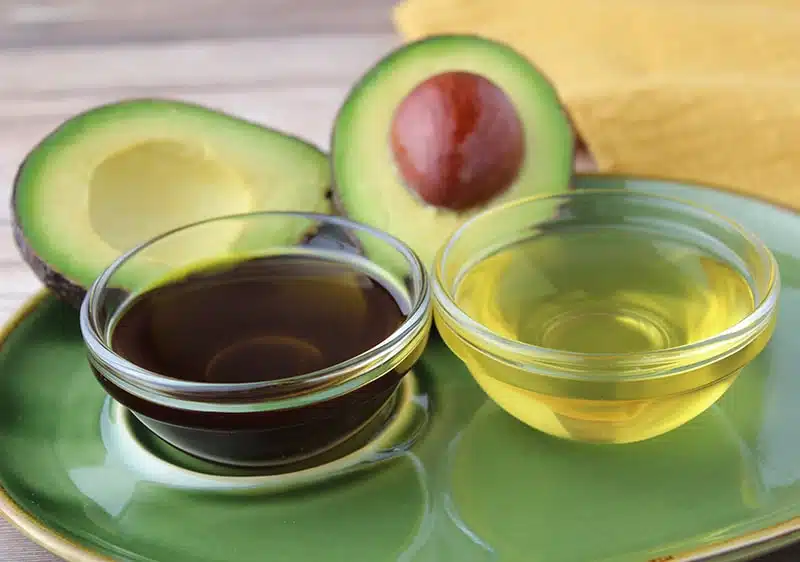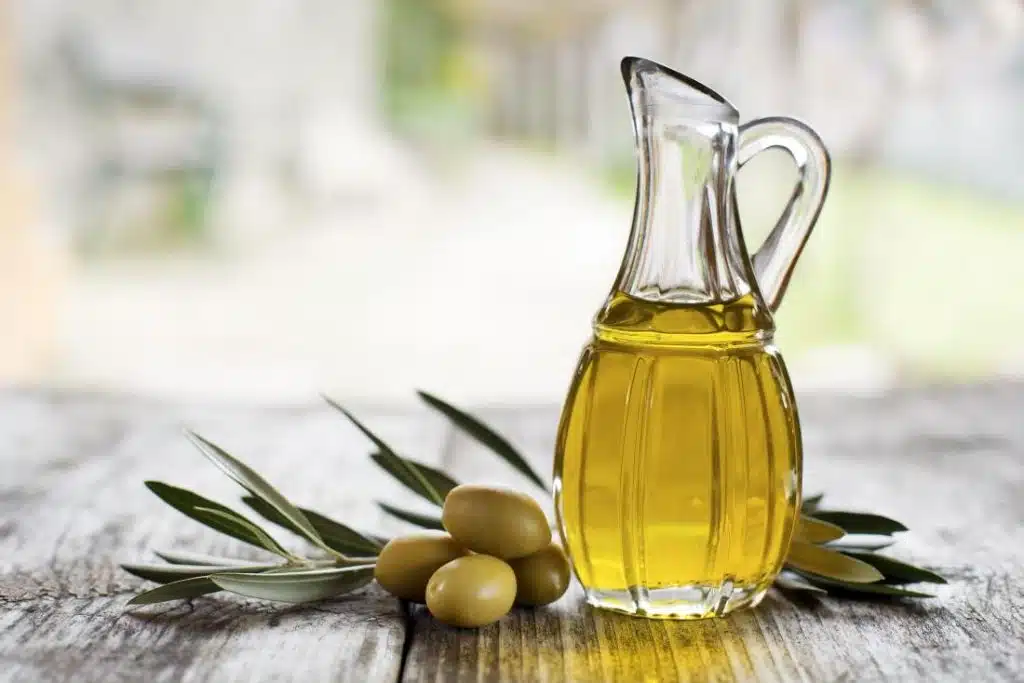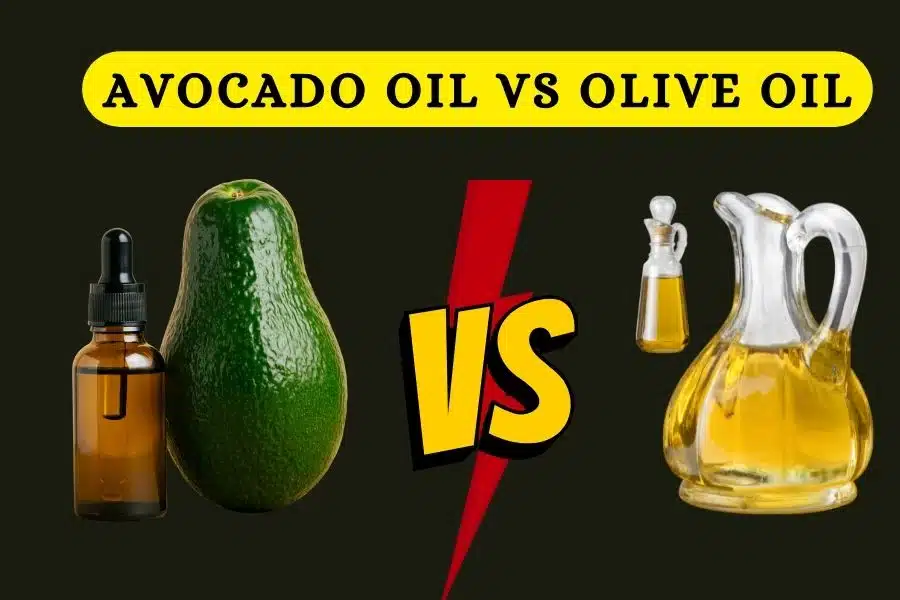With the various options for cooking oils, it is difficult to figure out which ones work well, right?
While you might already be familiar with olive oil, another newcomer is avocado oil which is gradually becoming more sought-after.
The main differences between olive and avocado oils are the flavor and smoke point, which makes their usage largely according to personal preference.
When it comes down to selecting the best oil to use in cooking, it can be difficult to decide which one is most suitable. We’re breaking it down and putting them through the test, and comparing avocado oil with olive oil!
You May Also Find Useful: Avocado Acid Reflux: Is Avocado Good For Acid Reflux? Healthy Recipes Using Avocado
Let’s explore Avocado oil vs. Olive oil:
Avocado oil vs olive oil
In this comparison, we learn what is best for our health, hair, and skin. Take a look. It is interesting to compare two of the healthiest oils and discover the benefits that they have for your health, hair, and skin.
Let’s compare avocado oil and olive oil according to their nutritional value:
| per 100 grams | Olive oil | Avocado oil |
| Monounsat. fat (n-9) | 76 g | 70.6 g |
| Omega 3 | 0.5 g | 0.9 g |
| Omega-6 | 6.0 g | 12.5 g |
| Saturated fat | 14.0 g | 11.6 g |
| Trans fat | <0.5 g | <0.5 g |
| Vitamin E | 18 mg | 12.6 mg |
| Vitamin K | 60 mg | 91.4 mg |
| Smoke point | 160-190 ° C (320-374 ° F) | 270 ° C (520 ° F) |
Nutritional Value
Not only monounsaturated fats, avocado oil, and olive oil are both rich in omega-3 and omega-6, along with lots of vitamin E. Both avocados and olive oil prevent many diseases, reduce high blood pressure and cholesterol, and maintain hair quality.
But when it comes to comparison, what can be considered healthy among both? Which oil is healthy if we compare avocado oil vs olive oil? Although both have their share of positives if one day you go to the store to buy these oils, which should be your first preference?
Smoke point
The smoke point of avocado oil (520° F) is much higher than that of other healthy oils such as olive (extra virgin 320° F), and unlike this, we can use it for frying without losing its properties.
Low levels of avocado oil, which is free of fatty acids, provide a very high smoke point; for this reason, in some countries like New Zealand, it has become a very popular oil for frying fish, chicken, and venison. Impregnates less fried food, which makes it less caloric.
Fats
avocado oil is characterized by containing a low proportion of saturated fatty acids and a greater amount of healthy fats, even compared to olive oil.
The oleic acid reaches up to 80 percent of the total fatty acids in avocado oil. With this monounsaturated fat, blood levels of ” good cholesterol ” (HDL-cholesterol) increase.
Antioxidant oils
This is especially true for carotenoids, a type of antioxidant that we can find in many colorful fruits and vegetables. They are fat-soluble, which means that your body absorbs them better when consumed along with fatty foods.
Interestingly, one study found that eating a salad dressed in avocado oil significantly increased carotenoid absorption from vegetables. Similarly, one study found that adding olive oil to a glass of tomato juice increased the absorption of lycopene carotenoid. They are rich in antioxidants, promote skin health and increase nutrient absorption.
Skin health
Avocado and olive oil benefit your skin in large part due to their fatty acid profile and vitamin E and lutein content. We can see that applying avocado oil can help soothe dry, cracked, or damaged skin. In addition, it can help the treatment of psoriasis.
A small study found that applying a topical cream that contains avocado oil and vitamin B12 improves the symptoms of psoriasis.
Animal studies have also observed that avocado skin benefits can help wound healing by increasing collagen production and decreasing inflammation. Similarly, olive oil is a part and parcel of cosmetic products and skin care.
Numerous studies have pointed out the beneficial effects of olive oil on skin health, including preventing infections and helping to heal burns, cuts, and pressure wounds.
Uses in Cooking
Olive oil is great for salad dressings as well as moderate- to low-temperature cooking. When cooking at high temperatures, it is not recommended to cook with olive oil as it may transform from monounsaturated (good fat) to trans-fat (very bad fat).
However, avocado oil remains stable at temperatures above 100 degrees, which means it can be safely used for high-temperature fryers, as well as baking.
Due to the smoke point, Avocado oil is best used for cooking with high heat. Things such as baking, roasting, searing, and grilling will all be great using avocado oil.
Olive oil is ideal for drizzling on salads and pasta dishes, as well as short salutes or just dipping bread in.
Taste
Avocado oil has a light flavor that is nutty. It’s ideal for marinades, dressings, and dips. The high smoke level makes it a fantastic oil to fry, saute, bake, and saute.
Olive oil is a common ingredient in Mediterranean as well as Middle Eastern cuisines. Its fruity, rich flavor is ideal for marinades, dressings, and dips. It’s also a favorite oil for sauté, baking, roasting, and frying.
Avocado oil can be a good option for those who desire the taste of the food you cook to be a highlight. It could help you incorporate into a greater variety of recipes, such as bread, cakes, and other baked items.
Olive oil, however, has a distinct flavor. It is a fruity, slightly spicy taste that many people like, but it may cause problems with certain dishes. This is why it might be used for dressing salads and cooking vegetables and meats instead of being used in sweet dishes such as bread, brownies, or cakes.
A potent antioxidant polyphenol known as oleocanthal within olive oil is responsible for the mild spicy flavor you get in premium extra-virgin olive oils.
The bottom line is that avocado oil is more adaptable. Olive oil goes well with dishes that feature lemon juice, garlic, and other herbs used in Mediterranean cuisines, like oregano, thyme, and parsley.
Avocado oil can be more adaptable because it can be used in all kinds of cuisines, as it has virtually no taste.
Cost
Cost-wise, both oils are comparable in price. It’s possible to locate super expensive avocado oil or olive oil that has been cold-pressed and not touched at all.
You can also find cheaper versions. It appears that avocado oil is around 50% more in cost than olive oil of the same quantity or similar quality.
In general, avocado oil tends to be slightly costlier than olive oil. But the price is largely based upon the grade of oil. There are a lot of low-cost varieties of olive oil and avocado. It’s better to invest in premium avocado and olive oils.

Is one healthier than the other?
The answer is: Avocado oil isn’t healthier than olive oil, and the reverse is true. In terms of nutrition, it’s impossible to make a mistake with either. It depends on your preference for flavor and cooking technique.
When you look at the numbers, both olive oils and avocados seem nearly identical. We requested two registered dietitians to comment, and both of them had similar answers.
Both olive oil and avocado oils are alike in terms of nutritional value and offer many advantages for health. Olive oil has a little higher levels of vitamin E; however, it’s important to remember that it is lost in cooking at high temperatures.
Both avocado oil and olive oil are great options to include in healthy eating habits. They’re very similar in that they both have similar levels of heart-healthy monounsaturated fatty acids and antioxidants. The primary difference lies in the smoke point.
What is better: avocado oil or olive oil?
Overall, avocado oil has some advantages over olive oil. Both are high in good fats but low in saturated fats, bad and bad. However, avocado oil is a bit higher in vitamin E than olive oil.
It comes down to the use of oil. The decision to choose an oil will depend on what you will be using it to do.
Both are suitable for salad dressings, and both are often used in soaps and cosmetics.
If you’re in search of oil to cook with that can be used for stir-frying and deep-fried foods, then avocado oil is your best choice. It has an increased smoke point, which means it can stand up to greater temperatures than olive oil.
Is avocado oil the new olive oil?
Avocado oil has always been there. In fact, in the United States and Mexico, it is a basic (classic) in your kitchen. However, in recent months, many more countries are strongly talking about this.
Several nutritionists are referring to it as a superfood and, in part, it is shaking the foundations of olive oil. Yes, the king of the Mediterranean diet could have a rival in the Olympus of superfoods. Avocados are getting more and more popular as people are now using avocados for weight loss as well.
Avocado oil and olive oil are two oils that have excellent nutritional and cardiovascular properties, but one will never replace the other., being able to coexist both in the diet ”, explains the expert.
You know, even though avocado oil and olive oil have a long list of benefits to prove their worth, it has been found that avocado oil is a little more effective in every domain.
To begin with, avocado oil has more nutrients and monounsaturated fats than olive oil and therefore is absorbed deeper into the skin. In addition, we see that when it comes to comparing healing properties, avocado oil is much more effective and faster than olive oil.
Avocado acts as a shield for the skin from the harmful rays of the sun, and it does it better than every oil in the world. If you find it hard to find the right sunscreen for yourself, you can also buy a bottle of avocado oil. It not only keeps your skin hydrated for several hours but also allows you to expose your body to the sun without any worries. Finally, during cooking, avocado oil burns at a much higher temperature than olive oil.
It means that olive oil burns much earlier than avocado oil. Note that the free radicals created during the burning of oil are considered harmful to health and are a key cause of various diseases.
We cannot neglect the benefits of olive oil. However, now that we have discussed avocado oil vs olive oil, avocado oil just wins hands down. However, it really doesn’t count on which oil you ultimately choose for yourself.
The main thing is the number of health benefits you are going to get from them. Depending on what you end up buying, make sure that you regularly use it. Because glowing skin and shiny hair is not something that you can do overnight.

So which one should you cook with?
Do you remember that whole story concerning smoke points? This is why it’s important. The smoke point is that temperature where the cooking oil ceases to shimmer and begins to smoke. It’s not necessarily an issue (sometimes you’d like a scorching hot pan). However, it must be considered.
If you go over the point of ignition and the oil can begin to break down, it will make you taste bitter and release free radicals. It could also become close to lighting on flames. It’s basically tasteless and is not good for your health.
Avocado oil has a higher smoke point than olive oil, and it begins to break down and degrade at a lesser temperature. The precise avocado oil that is unrefined has an average smoke point of 480deg.
Olive oil should only be employed in raw forms (like salad dressing) or cooked at a lower temperature (like baking, poaching oil, and slow-roasting).
A final note to make: extra pieces of vitamin E found in olive oil may actually be destroyed in cooking at high temperatures. So it’s crucial to keep your EVOO of choice for cold-weather applications for the best results.
Avocado oil can be used for moderate to high-temperature cooking; however, we would not recommend it for cooking at ultra-high temperatures. It is a great choice for sauces and can be used to roast vegetables and bake with them as well.
Which cooking oil do you pick? The main point is that oils from avocado and olive are nutritious choices that are packed with antioxidants that are good for you and unsaturated fats that are healthy for your heart. Pick the one that tastes best to you, matches your budget, and is compatible with your food recipe.
Where can we find avocado oil?
We extract avocado oil from the pulp of the avocado fruit. It is available refined or unrefined, and has been associated with numerous health benefits. We extract avocado oil from the avocado fruit, which we get from the avocado tree (Persea americana), which contains approximately 60% oil and other nutrients.
Although it is native to Central America, avocado is now produced in many parts of the world, including New Zealand, the United States, South Africa, and Spain.
You can buy refined or unrefined avocado oil. The unrefined version is cold-pressed, preserving its color and natural flavor. On the contrary, refined avocado oil is extracted with heat and sometimes with chemical solvents. Typically, the refined oil is bleached and deodorized, resulting in a less tasty product.
Where can we find olive oil?
We extract olive oil from pressed olives, and it is available in several varieties. It has been associated with numerous health benefits. There are many varieties available, including pure olive oil, extra virgin olive oil, or virgin olive oil.
Virgin and extra virgin olive oil are extracted by cold pressing. Olive oil labeled “olive oil” or “pure” contains a mixture of cold-pressed oil and refined oil that has been extracted by chemicals or heat.
Avocado oil is versatile and has culinary, and skincare uses. Countless studies have linked avocado oil with powerful health benefits, including reduced levels of LDL (bad) cholesterol and triglycerides.
Like avocado oil, olive oil has long been popular for its potential health benefits, including a lower risk of certain types of cancer and better levels of cholesterol and blood sugar.
Final words
I hope you have no confusion now about Avocado oil vs. Olive oil.
In general, both olive and avocado oils are healthy sources of antioxidants and healthy fats.
Both oils improve heart health because of their similar levels of oleic acids, an omega-9 fatty acid that is monounsaturated.
Furthermore, both help to improve the health of your skin and assist in wound healing.
Avocado oil comes with a high smoke point when compared to olive oil, which means it could be more suitable for cooking at high temperatures.
Whatever you decide to use, regardless of which one you choose, avocado oil and olive oil are healthy supplements in your daily diet. I hope you find the article “Avocado Oil vs Olive Oil: Which One Should You Take?” helpful.
FAQ
Is avocado a good cooking oil?
Yes, Avocado oil is a fantastic cooking oil. It has a smoke point of around 500 degrees Fahrenheit. This means it can withstand higher temperatures before it begins to burn. This makes it an ideal option for cooking or sautéing food items at high temperatures.
In contrast, the Extra virgin olive oil’s smoking temperature is between 325 to 375 degrees Fahrenheit which means it could begin to create unattractive smells prior to cooking it with high heat.
Can I substitute Avocado oil for olive oil?
Yes, you can substitute avocado oil with olive oil since they share similar nutritional benefits. But be mindful that avocado oils may be a little bit sour.
If you’re making use of the oil in dressings for salads or as a part of the course of eating where you’ll actually taste the oil, you may not need to replace avocado with olive oil.







